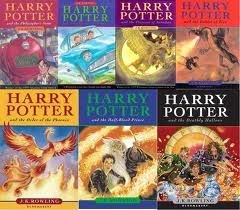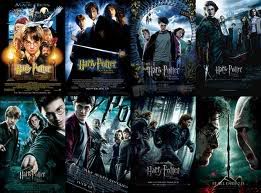Harry Potter—Books vs Films
By Charlotte Parr


The Harry Potter films have sparked off a whole different group of fans, those that have seen the films but not read the books and personally, I think they’re missing out on a lot. As great as the films are there are other bits of detail that are skipped out in the films. For example, early on in the series a comment is made about Peeves, Hogwart’s resident poltergeist, knocking something over which leads to a large crash. Although at the time it seems insignificant we later learn that the item Peeves knocked over was the vanishing cabinet that appears later in the series. Although this did not affect the plot of the films in any way, it was a shame that they couldn’t include these small details that made me smile.
There are also some larger plot points that are entirely skipped out. In ‘Harry Potter and the Goblet of Fire’, Dobby and his house-elf friend, Winky, make an appearance in the Hogwart’s kitchens, which is not included in the films. This means that Hermione’s ‘Society for the Promotion of Elfish Welfare’ (SPEW) isn’t set up, missing out a whole different subplot to the story. It also leads to an even bigger plot change, as in the book it is Dobby who gives Harry the gillyweed to help him with the second task, but in the film it is Neville who finds the plant and steals it from Snape’s store, a much less convincing idea.
There are some other, more minor points that were excluded from the books that I would really have liked to have seen. For example, the reappearance of ex-Defence Against the Dark Arts teacher, Gilderoy Lockhart, in St Mungo’s Hospital for Magical Maladies and Injuries was something I was looking forward to. So when the St Mungo’s section was cut out entirely from the film I was decidedly disappointed. It’s also at that point that you find out about Neville’s parents, something that is glossed over in the films that really develops Neville as a character and I feel takes something away from him.
Of course we can’t just dismiss the films as terrible just because they don’t stick religiously to the plot of the books. When you adapt a book for the screen it is practically impossible to include every small detail from the original text and everyone is going to have different opinions about what they think the film should have been like, who should have been cast in what role and whether the set was how they imagined it.
You also have to take into account the amount of time these people have. No-one would go to see a film if it was five hours long, so the production team have to make cuts somewhere, picking out the best and most important bits to make the film as good as they can.
But when you separate the films from the books you can appreciate them for what they are, a wonderful story being acted out on the screen in front of you. They are enjoyable in their own right, as are so many other book adaptations, and it seems unfair to judge them based on the details from the books that they couldn’t put into the films.